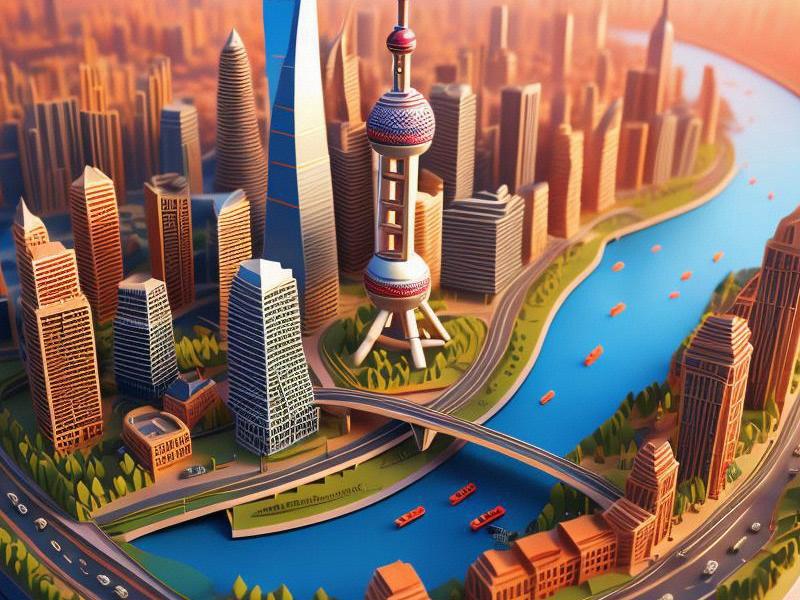
Shanghai's Economic Powerhouse
Shanghai's rise as an economic powerhouse is nothing short of remarkable. Over the past few decades, the city has transformed from a relatively small port town into a global financial center. The Shanghai Stock Exchange, one of the largest in the world, plays a pivotal role in the city's economic landscape. It attracts investors from around the globe, facilitating the flow of capital and fostering economic growth.
The city's strategic location along the Yangtze River Delta has made it a key player in China's domestic and international trade. Shanghai Port, the busiest container port in the world, handles millions of containers annually, connecting China to markets across the globe. This maritime gateway has been instrumental in driving Shanghai's export-driven economy and solidifying its position as a vital node in the global supply chain.
In addition to finance and trade, Shanghai has emerged as a leader in industries such as technology, manufacturing, and real estate. The city's skyline, dominated by iconic skyscrapers like the Shanghai Tower, the Jin Mao Tower, and the Oriental Pearl Tower, is a testament to its rapid urbanization and economic success. These architectural marvels house some of the world's leading multinational corporations, research institutions, and startups, making Shanghai a hub for innovation and entrepreneurship.
Cultural Richness and Heritage
Beneath the bustling streets and modern skyscrapers lies a rich tapestry of history and culture. Shanghai's unique blend of traditional Chinese and Western influences has created a distinct cultural identity that sets it apart from other cities in China.
上海夜生活论坛 The Bund, a historic waterfront area, is a prime example of Shanghai's colonial past. Once lined with British, French, and American concessions, the Bund showcases a fascinating array of Art Deco architecture. Today, it serves as a popular tourist destination, offering stunning views of the futuristic skyline across the Huangpu River.
Nanjing Road, one of the world's busiest shopping streets, is another cultural landmark. This vibrant pedestrian street is a melting pot of shops, restaurants, and entertainment venues, reflecting the city's cosmopolitan spirit. From high-end boutiques to traditional Chinese medicine stores, Nanjing Road offers something for everyone.
Shanghai's cultural scene is further enriched by its museums, theaters, and art galleries. The Shanghai Museum, renowned for its extensive collection of ancient Chinese art, attracts millions of visitors each year. The city's theaters host a wide range of performances, from traditional Peking opera to contemporary theater productions, showcasing the diversity of its cultural offerings.
Urban Development and Sustainability
上海喝茶服务vx As Shanghai continues to grow, the city faces significant challenges related to urban development and sustainability. Rapid population growth and urbanization have put pressure on infrastructure, housing, and the environment. However, the city government has implemented various initiatives to address these issues and ensure sustainable development.
One of the key strategies is the promotion of green spaces and sustainable urban planning. Shanghai has developed numerous parks and green belts, such as Century Park and Zhongshan Park, providing residents with recreational areas and improving air quality. The city has also invested in public transportation systems, including the Shanghai Metro, which now boasts one of the most extensive and efficient networks in the world. By encouraging the use of public transport, cycling, and walking, Shanghai aims to reduce traffic congestion and carbon emissions.
In addition, Shanghai is at the forefront of renewable energy and smart city technologies. The city has set ambitious targets for reducing greenhouse gas emissions and increasing the use of clean energy sources. Solar panels, wind turbines, and energy-efficient buildings are becoming increasingly common, contributing to a more sustainable urban environment.
Global Influence and Future Prospects
Shanghai's global influence extends far beyond its economic and cultural achievements. As a member of the World Expo Organizing Committee, the city successfully hosted the 2010 World Expo, attracting millions of visitors from around the world. This event showcased Shanghai's ability to organize large-scale international events and highlighted its commitment to innovation and sustainability.
爱上海419 In recent years, Shanghai has also played a crucial role in China's Belt and Road Initiative, a massive infrastructure project aimed at enhancing connectivity and trade between Asia, Europe, and Africa. As a key node in this initiative, Shanghai is expected to benefit from increased investment and trade opportunities, further solidifying its position as a global hub.
Looking ahead, Shanghai's future prospects are bright. The city continues to attract talent, investment, and innovation from around the world. With its strong economic foundation, rich cultural heritage, and commitment to sustainability, Shanghai is well-positioned to become a model for urban development in the 21st century.
However, the city must also address the challenges of inequality, environmental degradation, and social cohesion. By prioritizing inclusive growth and sustainable practices, Shanghai can ensure that its continued development benefits all residents and contributes to a better future for humanity.
In conclusion, Shanghai is a dynamic metropolis that embodies the spirit of China's rapid modernization. Its economic prowess, cultural richness, urban development, and global influence make it a city of immense significance. As Shanghai continues to evolve, it serves as a beacon of hope and inspiration for cities around the world, demonstrating the potential of urbanization to drive progress and crteeaa better future for all.
